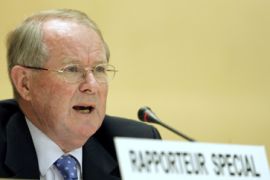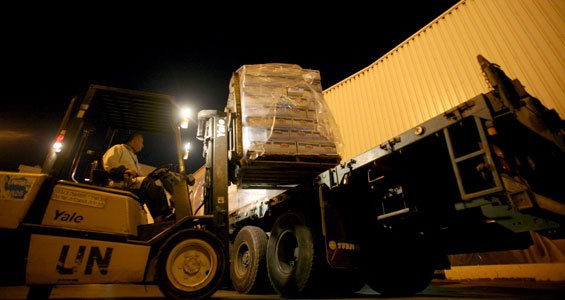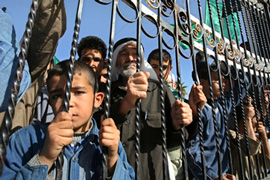Interview: John Dugard
Former UN human rights official says the world body must do more for Palestinian rights.

 |
| UN relief supplies have been trickling into Gaza since Israel imposed a blockade [EPA] |
On December 10, 1948, the UN General Assembly (GA) adopted the Universal Declaration of Human Rights (UDHR), which was seen as a considerable achievement in the post-war era.
However, the UDHR was immediately put to the test in May of that year when the State of Israel was formed, creating one of the largest refugee crises since the war – the Palestinian exodus and the ‘Nakba’.
Keep reading
list of 4 itemsWhat happens when activists are branded ‘terrorists’ in the Philippines?
Are settler politics running unchecked in Israel?
Post-1948 order ‘at risk of decimation’ amid war in Gaza, Ukraine: Amnesty
In the 60 years since, the UN has worked with Palestinian refugees and provided humanitarian assistance through its various organisations.
John Dugard, a South African professor of international law, was the UN’s special rapporteur on human rights in the Palestinian territories from 2001 until 2008.
He has served as judge ad hoc in the International Court of Justice and since 1997, as a member of the International Law Commission of the UN.
In 2000, he became its special rapporteur on Diplomatic Protection until 2006.
Following the start of the second Palestinian Intifada in late 2000, Dugard was appointed as chairman of a UN Commission on Human Rights.
Al Jazeera spoke with Dugard about the human rights and relief situation in Palestine.
Al Jazeera: How have the GA and the Security Council addressed the issue of the Palestinians in the past 60 years?
Dugard: Lets start with the GA – it has limited powers.
 |
| The Quartet has not been effective in Palestine, NGOs have said [AFP] |
It only has powers of recommendation. It has adopted many resolutions on Palestine criticising Israel – so one can’t really fault the GA. But my criticism of the GA is, at present, its failure to challenge the Security Council, the Quartet, and the secretary-general.
The GA could insist that the Security Council take steps to enforce the 2004 Advisory Opinion of the International Court of Justice [in 2004, the ICJ issued an advisory opinion finding the ‘separation wall’ illegal and calling for its removal and for the compensation of the affected Palestinian residents for any damage done].
It could also question the role of the UN in the Quartet. It could also challenge the secretary-general, who has failed to represent the interests of the UN in the Quartet.
It could also do more to challenge the failure of the secretary-general to activate the Register of Damages.
In terms of a resolution in 2004, the GA instructed the Secretariat to establish a Register of Damages to enable Palestinians whose land had been seized by the construction of the [separation] wall to make claims for compensation.
A board has been established for this purpose, but as yet some four years later no real start has been made to process the claims.
The problem with the Security Council is the veto – and it is clear that the US will veto any attempt to take a tough line on Israel.
France and Britain also give some support to Israel and so the result is that the Security Council has failed to take meaningful action on the subject of Palestine.
Instead it has handed over all authority to the Quartet and it is quite clear that in the Quartet the UN plays a very limited role.
The UN makes all the important decisions for the Quartet.
And this explains why the Quartet for instance has not even acknowledged the existence of the 2004 [ICJ] advisory opinion. It also explains why the Quartet fails to communicate with Hamas in Gaza or the West Bank.
In a report they issued earlier this year, a consortium of 20 international NGOs harshly criticised the Quartet, saying that in spite of the Gaza ceasefire, it “has been unable to end Gaza’s isolation or facilitate adequate flows of humanitarian goods”.
The report also spoke of “the urgent need to go beyond rhetoric” and ensure Israeli compliance “with their obligations under international law”.
The NGOs also criticised the failure of the Quartet to stop the growth of settlements, as well as checkpoints and roadblocks, which have increased to over 600.
They complained about the failure of the Quartet to do anything constructive really.
It should be guided by the 2004 Advisory Opinion but it’s guided by the roadmap which is completely out of date.
It’s interesting at the Annapolis meeting and in all subsequent meetings the secretary-general always refers to the roadmap, not the ICJ opinion.
Surely the UN has made some positive contribution to the conflict. What about the role the UNRWA (UN Relief and Works Agency for Palestine Refugees in the Near East) has played?
 |
| The Israeli blockade has debilitated health care in the Gaza Strip |
A sharp distinction must be drawn between the UN in New York and the UN agencies on the ground.
It is generally accepted that UN agencies such as UNRWA, OCHAopt, Office for the High Commission for Human Rights, and specialised agencies such as the World Health Organisation (WHO), Food and Agriculture Organisation (FAO), and the World Bank, have all done their best to care for the needs of the Palestinian people.
However all these agencies can do is to care for the material needs of the Palestinian people.
They cannot further the peace process. That must be done in New York. So there is a tension between the UN in New York and the UN on the ground.
In my experience this has confused many Palestinians, because they appreciate the work that the UN is doing on the ground in areas such as health, education, food, and welfare. On the other hand, they see a UN in New York that is totally controlled by the US.
I think it would be wise if the GA were to address this issue. The GA annually adopts resolutions criticising Israel, but it makes no attempt to redress the conduct of the Secretariat or the secretary-general. It also puts no pressure on the Security Council.
How has the political and legal landscape changed since you became involved seven years ago?
The situation has seriously deteriorated. In particular, Israel has seized large parts of Palestinian land.
It is recognised that Palestinians have rights of self-determination, but there is no viable state for those rights to be exercised because Israel has seized lands by building settlements, by the Wall, and by its control over the Jordan Valley.
The UN hasn’t really prevented Israel from seizing land. And land is the big issue.
In your February 2007 report as Special Rapporteur, you compared Israel’s policies in the Occupied Palestinian Territories to Apartheid South Africa – a claim Israel rejected as enflaming hatred between Jews and Palestinians.
My only comment is that it’s really interesting to compare the response of the UN to Israel/Palestine with the response of the UN to Apartheid, despite the fact that there are great similarities between the two systems.
The Security Council imposed an arms embargo on South Africa. When the International court gave an international opinion, the UN took it seriously. In fact the UN used the advisory opinion on Namibia as a guide to its handling on the Namibian affair.
So the response of the UN was completely different both in respect to South Africa and to Namibia.
I do not see how a settlement can be reached which binds only a section of the Palestinian community. Obviously Hamas has to be included in the negotiations. Also the negotiations should take place within the framework of international law and there is no evidence that they are doing that.
What has changed since your last report [March 2008]?
My main complaint then was about the failure of the Quartet and the Security Council to pay attention to the Advisory Opinion of the ICJ.
Since that time, settlements have increased. Roadblocks have increased. The humanitarian crisis in Gaza has worsened.
The human crisis in the West Bank remains. Hardly any [Palestinian] prisoners have been released.
It’s ridiculous that Israel arrests several hundred Palestinians every few months and then gets credit for having released two or three hundred prisoners. Israel really has to do something about Palestinian prisoners. And of course construction of the Wall continues.
The UN has often been accused of harbouring an anti-Israel bias. Israel and the US accuse the Human Rights council in particular of being biased against Israel.
It is true that the human rights council is dominated by the developing world. And it is true that the developing world protects its own members.
For instance the Human Rights council has taken no action on the Zimbabwe case. On the other hand, the West is very protective of Israel in respect of Palestine. So in effect one sees both sides applying a double standard.
The West applies a double standard as far as Israel is concerned and condones Israel’s violations of international and human rights law and the developing world applies a double standard as far as its own members are concerned.
I think it must be acknowledged that the protection that the West gives to Israel is a source of great annoyance to the developing world. I believe this has serious implications for the future of human rights in the UN system.
What must now be done to ensure that Israel abides by its international commitments and responsibilities?
The only body capable of doing anything is the Security Council, and the Security Council cannot act because of the veto. I suppose the Quartet could also do something, but the Quartet is controlled by the US, so it’s really quite a hopeless situation.
But I really think the GA can do more to put more pressure on the secretary-general, secretariat, on the Quartet.
How so?
I think a resolution of the GA asking the secretary-general to withdraw from the quartet would be very helpful, because the Quartet achieves nothing but the presence of the UN in the Quartet gives it legitimacy.
I think that’s the problem. And it’s interesting that the secretary-general usually speaks on behalf of the Quartet to give it that legitimacy that it would otherwise lack.
Why does it seem no one trusts the UN?
The US takes all the important decisions effecting security for the UN when it comes to the Middle East.
Has not the UN at the very least provided a platform for Palestinian political claims?
The UN has undoubtedly done a lot to promote the interest and self-determination of the Palestinian people. But in my opinion it could do more. And the problem there is this tension between the secretary-general and the Secretariat on the one hand, and the GA and the agencies on the ground on the other hand.